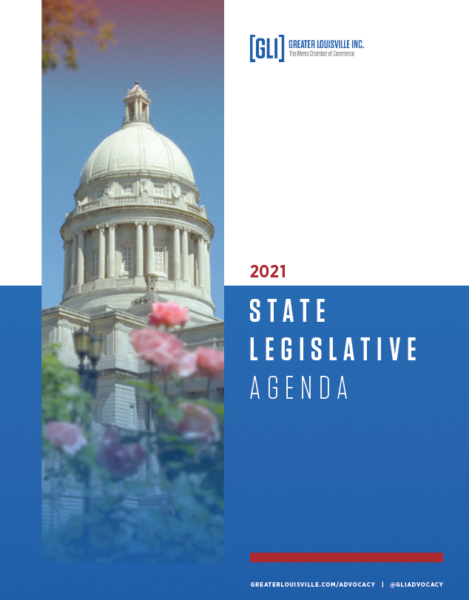2021 State Legislative Agenda
 The 2021 legislative sessions in Frankfort and Indianapolis come at a truly unique moment not only in our region’s history but our nation’s as well. We are facing a global pandemic, a nationwide movement calling for racial justice, and the most daunting economic recession in generations. On top of these challenges, lawmakers in Kentucky and Indiana must craft state budgets in an era of unprecedented fiscal uncertainty.
The 2021 legislative sessions in Frankfort and Indianapolis come at a truly unique moment not only in our region’s history but our nation’s as well. We are facing a global pandemic, a nationwide movement calling for racial justice, and the most daunting economic recession in generations. On top of these challenges, lawmakers in Kentucky and Indiana must craft state budgets in an era of unprecedented fiscal uncertainty.
GLI’s 2021 State Legislative Agenda presents the Greater Louisville business community’s public policy recommendations for tackling these challenges and positioning our region to swiftly recover our economy and get to work on building a more equitable and inclusive society.
The 2021 State Legislative Agenda incorporates the policy objectives of GLI’s NOW Louisville: 2020-2025 Strategic Plan and feedback from the hundreds of business leaders who serve on GLI’s Issue Advisory Committees, Task Forces, Public Policy Council, and Board of Directors. Counsel was also provided by GLI’s Business Council to End Racism. Our policy priorities seek to support businesses of all sizes through the COVID-19 pandemic and economic recovery, build a more equitable and inclusive community and address the roots of racism in our society, attract talent and develop our workforce, and accelerate economic growth.
SOME OF GLI’S KEY STATE LEGISLATIVE PRIORITIES FOR 2021 INCLUDE:
- Establishing protections for regional employers from opportunistic lawsuits seeking to exploit the COVID-19 pandemic
- Ensuring that the restoration of Kentucky’s unemployment insurance trust fund does not fall solely on the backs of employers
- Protecting employers from tax increases and securing regulatory relief to drive the economic recovery
- Identifying opportunities to address racial inequities through legislative solutions
- Reforming our criminal justice system to support workforce development
- Rebuilding trust between law enforcement and communities
- Stabilizing our regional child care sector to ensure child care is not a barrier to employment for working parents
- Supporting equitable workforce development and participation strategies through funding for education, public transportation, and training initiatives
- Fostering regionalism through the establishment of reciprocity between economic development incentive programs offered by Kentucky and Indiana

